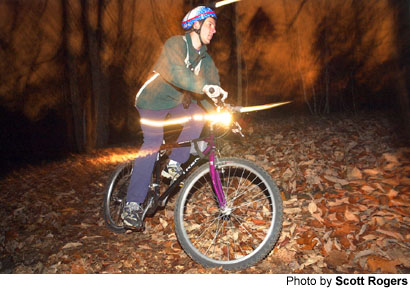
December 5, 2000 — There was a moment during my nighttime mountain bike ride with members of the Southern Off-Road Bicycle Association when I felt totally free.
I was in midair, flying headfirst over my handlebars into the pitch-black forest of Chicopee Woods. I had no idea what hazards stood before me, only that the crisp evening air was everywhere. I was in limbo.
The freedom was fleeting, of course. My body soon collapsed upon collision with the earth. My left wrist took the brunt of the blow, my right knee the rest. It could have been worse. I just missed hooking a huge tree.
I found my bike a few paces back in a tangle of briers. It had hit the ground hard, headlight first. I was now down to one light source — the lamp attached to my helmet — and wasn’t yet halfway around the 5-mile Walnut Creek Outer Loop trail.
The others likely were. It had been some time since I had been close enough to see the glow of the rest of the group ahead of me. There were about 20 of them, hardy souls who ignored the forecast for foul weather and headed out into the lightless woods on bicycles.
The shortened days of winter don’t stop the true mountain bikers. Not much does.
“Most people who like to ride at night are, well, they’re addicted,” said Tom Sauret, SORBA’s executive director and an English professor at Gainesville College. “They need to go out and do it.”
Saturday’s group split up into two packs. The fast “hammer group” — I saw these guys at the start, never again — and everyone else. Soon, Sauret and I formed a third group of sorts.
Meanwhile, there were several other mountain bikers back at Elachee Nature Science Center enjoying barbecue and beverages around a bonfire, all part of SORBA’s annual holiday party. They had opted out of this night ride. Too cold, too wet, they told me beforehand.
That good sense told these avid riders to abstain was of no comfort to a newbie like me.
I hadn’t been mountain biking in years, not since I last did a Sporting Life column on the sport, in fact. And I had never been on SORBA’s trails at Chicopee Woods in the daylight, let alone the dark.
Nothing like riding blind.
“It’s a whole different world out there at night,” warned Gainesville’s Heather Wall, SORBA’s public affairs director. “You have no idea what’s coming up. Your reactions have to be much, much faster. Because once you’re there, it’s too late.
“It’s really a big rush.”
The sky had taken on a blackened blue as we gathered in the parking lot at 6 p.m. It was already dark out, but not too dark for me to see one thing clearly: The mountain bike I had owned since college was now severely outdated.
My companions sat atop space-age crafts — sleek and shiny — with front-wheel suspension and feather-light frames.
Their bikes were baroque; mine was broke.
Well, almost. The wheels went around fine. Shifting and steering were no problem.
But every time I squeezed the brakes it sounded like a wild animal was trapped inside my derailleur.
This strident squeak, I believe, was my bike’s way of getting back at me for all those years of neglect — and letting this lot full of SORBA-ites know there was bicycle abuser among them.
The plaintive cry became my calling card when we hit the trail. The other riders may not have been able to see me, but they could sure hear me — each time I hit the brakes.
And that was quite often. Turns and trees came out of nowhere. My reality was the 20 feet of light before me. All other obstacles were obfuscated by the enveloping darkness.
One good thing about mountain biking in the dark: It’s far more difficult for other riders to see your falls.
Yes, falls. Plural. There were several.
I was somewhat out of control. And certain parts of my body are now beginning to take on the color of that nighttime sky.
But Sauret was there to pick up the pieces. As the ride’s “sweep,” that was his job.
I’d speed off and fall. He’d catch up. And I’d speed off and fall again. We made a good team.
The teamwork would pay off later, as well. As we headed into the final stretch, my helmet light — my only light — grew dimmer and dimmer. And then it went dead.
Now I was really riding blind. But Sauret stayed close, and I was able to find my way following his light … kind of. There was that one time I rode into a ditch.
The rest of the group was now gathering at the parking lot, deciding who wanted to move on to the Lake Loop and continue riding.
“I’m going to do the barbecue loop,” Sauret said. “Twice.”
That sounded good to me.
There were other riders there, waiting for our arrival. One seemed surprised, disappointed perhaps, that I returned in one piece.
“What’s the fun of taking a newbie out if you’re not going to kill him?” he asked.
Well, somebody has to write the story.

